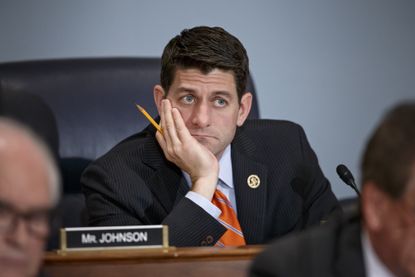Why won't Paul Ryan save the Republican Party and seize power?
Ryan was willing to be vice president, but won't sign on for speaker, a far more consequential role?


Few people would have imagined, when Rep. Paul Ryan (R-Wis.) and Vice President Joe Biden were politely sparring at the 2012 vice presidential debate, that three years later each man's party would be pleading for him to seize the apple of power. Yet here we are: Biden is weighing the personal cost-benefits of running for the Democratic presidential nomination amid a chorus of support from Democrats nervous about Hillary Clinton's campaign, and Ryan keeps on having to say no, emphatically, to stepping up to be speaker of the House.
Is being House speaker such a terrible job? You might think so, given John Boehner's positively gleeful retirement and House Majority Kevin McCarthy's stated reason for dropping his shoo-in bid to replace Boehner: The hard-right rump of his caucus will "eat you and chew you up."
But along with the big office, enlarged staff, and pay bump, the speakership comes with a lot of real power. You not only hold the gavel and the keys to committee assignments, but you set the agenda of the House of Representatives; generally speaking, nothing of consequence moves in Congress without your approval. Also, the House speaker is second in line for the presidency, after the vice president.
Subscribe to The Week
Escape your echo chamber. Get the facts behind the news, plus analysis from multiple perspectives.

Sign up for The Week's Free Newsletters
From our morning news briefing to a weekly Good News Newsletter, get the best of The Week delivered directly to your inbox.
From our morning news briefing to a weekly Good News Newsletter, get the best of The Week delivered directly to your inbox.
And for many Republicans and conservative commentators, the choice for the next speaker is obvious. "Ryan may be the only Republican with the national standing and conservative credentials to defy" the House Freedom Caucus, Sen. Ted Cruz (R-Texas), and the other GOP bomb-throwers that sank McCarthy's bid, said The Wall Street Journal in an editorial. "He's really the only viable — he's really the only one that can do the job," said Rep. Devin Nunes (R-Calif.), chairman of the House Intelligence Committee. "Everybody's eligible, but in terms of who can do the job and lead us into the next election cycle, we have to have a top-tier candidate, and really from the start of this, Kevin and Paul were the only two that we had at that caliber."
"Paul Ryan is gonna have to step up," former GOP congressman Joe Scarborough said on MSNBC on Thursday. "There is nobody else in the caucus or in the party that could bring together the conservatives and also bring together the Main Street Republicans like Paul.... I respect Paul wanting to stay out of this race.... At this point, I don't think it's up to Paul. He does not have the choice."
But of course, Paul does have a choice, and so far his choice is "no." He's going to face pressure to change his mind, because, apparently, the Republican Party's near-term political future is at stake.
For Scarborough, Ryan has to step up "not only for the Republican Party but also for the conservative movement — they can't afford to lose the White House for another eight years." The Wall Street Journal editorial board concurs: "The GOP enjoys its largest House majority since the 71st Congress of 1929-30," when the Great Depression hit, but unless Paul steps up, the House GOP "rump minority" could cost Republicans the House, Senate, and White House. At the same time, The Journal explains why Paul might be hesitant to leave the Ways and Means Committee for the speaker's chair:
He's said repeatedly he doesn't want the job, and no wonder. If the only way to become and remain speaker is to capitulate to the impossible demands of a rump minority, then you're being set up to fail.... He'd be assailed with the usual sellout and surrender epithets, any future presidential ambitions might suffer, and he'd have less time for his young children. But he could save the House majority from self-destruction. [The Wall Street Journal]
That may not sound so enticing. But Paul Ryan already signed on to be Mitt Romney's vice president, a job one previous officeholder unfavorably compared to a "bucket of warm piss." The vice president has no inherent power, and is hardly guaranteed a promotion four years later. A good number of presidential understudies leave the office to retirement, after doing very little of consequence. Some House speakers have left indelible marks on the American body politic.
Assuming the White House is Paul's ultimate goal — and he may be the rare, perhaps solitary, lawmaker in Washington not gunning for the job — he might take inspiration from James K. Polk, who rose from House Ways and Means Committee chairman to House speaker to president of the United States.
And if nothing else, there's the nice office and the raise. That would be enough for most Americans.
Create an account with the same email registered to your subscription to unlock access.
Sign up for Today's Best Articles in your inbox
A free daily email with the biggest news stories of the day – and the best features from TheWeek.com
Peter has worked as a news and culture writer and editor at The Week since the site's launch in 2008. He covers politics, world affairs, religion and cultural currents. His journalism career began as a copy editor at a financial newswire and has included editorial positions at The New York Times Magazine, Facts on File, and Oregon State University.
-
 The hunt for Planet Nine
The hunt for Planet NineUnder The Radar Researchers seeking the elusive Earth-like planet beyond Neptune are narrowing down their search
By Chas Newkey-Burden, The Week UK Published
-
 Magazine interactive crossword - April 26, 2024
Magazine interactive crossword - April 26, 2024Puzzles and Quizzes Issue - April 26, 2024
By The Week US Published
-
 Magazine solutions - April 26, 2024
Magazine solutions - April 26, 2024Puzzles and Quizzes Issue - April 26, 2024
By The Week US Published
-
 Arizona court reinstates 1864 abortion ban
Arizona court reinstates 1864 abortion banSpeed Read The law makes all abortions illegal in the state except to save the mother's life
By Rafi Schwartz, The Week US Published
-
 Trump, billions richer, is selling Bibles
Trump, billions richer, is selling BiblesSpeed Read The former president is hawking a $60 "God Bless the USA Bible"
By Peter Weber, The Week US Published
-
 The debate about Biden's age and mental fitness
The debate about Biden's age and mental fitnessIn Depth Some critics argue Biden is too old to run again. Does the argument have merit?
By Grayson Quay Published
-
 How would a second Trump presidency affect Britain?
How would a second Trump presidency affect Britain?Today's Big Question Re-election of Republican frontrunner could threaten UK security, warns former head of secret service
By Harriet Marsden, The Week UK Published
-
 'Rwanda plan is less a deterrent and more a bluff'
'Rwanda plan is less a deterrent and more a bluff'Instant Opinion Opinion, comment and editorials of the day
By The Week UK Published
-
 Henry Kissinger dies aged 100: a complicated legacy?
Henry Kissinger dies aged 100: a complicated legacy?Talking Point Top US diplomat and Nobel Peace Prize winner remembered as both foreign policy genius and war criminal
By Harriet Marsden, The Week UK Last updated
-
 Trump’s rhetoric: a shift to 'straight-up Nazi talk'
Trump’s rhetoric: a shift to 'straight-up Nazi talk'Why everyone's talking about Would-be president's sinister language is backed by an incendiary policy agenda, say commentators
By The Week UK Published
-
 More covfefe: is the world ready for a second Donald Trump presidency?
More covfefe: is the world ready for a second Donald Trump presidency?Today's Big Question Republican's re-election would be a 'nightmare' scenario for Europe, Ukraine and the West
By Sorcha Bradley, The Week UK Published